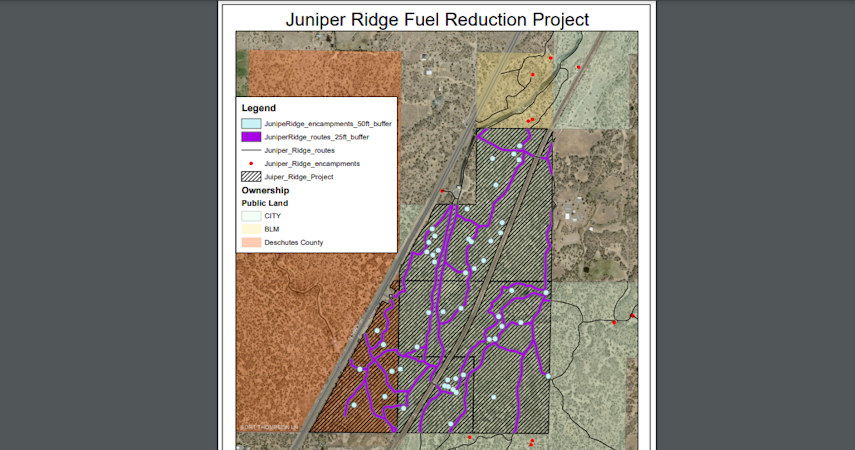Deschutes County seeks state grant for ‘ladder fuels’ treatment to curb fire danger amid Juniper Ridge homeless campsites

BEND, Ore. (KTVZ) – A lot of time, money and attention has been spent for years on helping homeowners and communities create “defensible space” around their properties, so a wildfire doesn’t have as much fuel to spread and cause even more danger and destruction.
Much the same has taken place on national forests and in other wooded areas.
But what about were those who are without a home have been camping in the woods for months, even years in areas near cities and neighborhoods?
Amid all the debate about how to move the homeless out of those locations (and where they go next), a new project is planned at Juniper Ridge, the 1,350-acre mix of Deschutes County and city-owned public land north of Bend, to reduce the danger such fires can pose.
And it would be done in much the same manner – treatments to trim and remove the “ladder fuels” that make fires spread faster, farther and more frighteningly.
This week, Deschutes County commissioners backed County Forester Kevin Moriarty’s request to seek a $75,000 Community Wildfire Risk Reduction Grant from the Oregon State Fire Marshal’s Office to conduct such fuels treatment at Juniper Ridge, in partnership with the city, on roads through the property and in the areas with dozens of encampments.
Moriarty explained in an issue summary that not only does Juniper Ridge (including an area often called Dirt World) border neighborhoods, mobile home parks, Highway 97, the BNSF Railway tracks and industrial property - it also has vital power, fiber and cellular lines and facilities running through it.
So far this year, he said, there have been 14 wildfire responses to Juniper Ridge, raising the total since 2020 to 48.
The grant money would be used to implement ladder fuels reduction along seven miles of unimproved roads and to conduct similar treatments near about 55 encampments in the area of highest concentrations (see map), near portable toilets and wash stations, Moriarty said.
Along with reducing fire risk, “it will also reduce the hazard risk to first responders,” the forester added.
While no local matching funds are required, Moriarty said the county will direct another $30,000 to improve the county-owned property, while the city has pledged to match with $50,000 to expand treatments on city-owned parcels.
